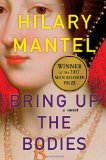“More of the same” would be an apt description for “Bring Up The Bodies” by Hilary Mantel, when I compare it to its predecessor “Wolf Hall”, and I mean this in a very good way. The author once again delivers a deliciously-written novel on the life of Thomas Cromwell, the chief minister of king Henry VIII of England, while remaining true to the historical record. The second in a planned trilogy of novels on his life, this book covers the dramatic period of about one year (1535-1536) leading to the execution of Anne Boleyn, the queen. Like the first book, this book has also managed to win the author a Man Booker Prize and the prize feels justly-deserved.
While the first book covered the rise of Cromwell and the rise of Anne to replace the king's first wife Katherine, the second book covers the fall and eventual execution of Anne. She falls out of favor with the king as she fails to deliver him a male heir and as he yearns for Jane Seymour. Cromwell had facilitated the annulment of the king's first marriage so that he could marry Anne and now the king once again asks him to find a way to remove Anne so that he can marry Jane.
Cromwell does this in a way that the “collateral damage” allows him to exact revenge upon the people who had participated in the fall and post-death mockery of his beloved mentor Thomas Wolsey. There is a dialogue in the novel that expresses this perfectly:
Mr Wriothesley looks at him speculatively. ‘I see. It is not so much, who is guilty, as whose guilt is of service to you.’
[…]
He says, ‘It may be that any of these gentlemen who are named could disarm suspicion. Or if suspicion remained, they could by some appeal stay the king's hand. [Wriothesley], we are not priests. We don't want their sort of confession. We are lawyers. We want the truth little by little and only those parts of it we can use.’
Apart from the queen, Cromwell ensnares five men (including the queen's brother) on trumped-up charges of adultery with the queen, incest and high-treason and eventually gets them executed. On the other hand, even though there are suspicions against Thomas Wyatt, Cromwell lets him go since he can be of service to Cromwell later. There is a beautiful sequence of scenes in the novel where Cromwell interrogates and extracts the confessions (such as they are) of each of the four courtiers who had mocked and dragged the corpse of Cardinal Wolsey, in a masque enacted after his death, by holding on to each of his limbs - Cromwell marks each such victory by noting the respective limb (e.g. “left forepaw”) held by the courtier in that masque.
The execution of the queen is described in much more detail than is usual for a novel. It is particularly poignant how she remains obsessed with little things about her appearance as she is about to be executed, while retaining hope till the very end that somehow the king will pardon her and rescue her from the execution. Of course, that never happens.
Soon after the execution, the king marries Jane and some time thereafter promotes Cromwell. At the end of the book, Cromwell reflects on his success while remaining somewhat apprehensive about whether it will really last.
As in the first book, the characters are relatable and speak a language that is easily understood by the modern reader. Even though you know the overall arc of the story-line, you still find yourself gripped by curiosity to see how it unravels and how the author builds up the situations leading the characters to act the way they do. One of my (minor) complaints about the previous book has been addressed by the author here - pronouns are better disambiguated when they might cause confusion (e.g. “he, Cromwell” instead of just “he”).
A complaint (again, minor) that I have about this book is that there are no examples of Wyatt's supposedly clever poems that hinted at his love for the queen yet remained ambiguous in their meaning. For that you will have to read the Wikipedia article about him, where you learn that in his poems he calls his mistress “Anna” and writes verses like:
And now I follow the coals that be quent, From Dover to Calais against my mind
that could imply that he followed Anne into France even as she was about to be married to the king. He had passed some of these poems to a few courtiers and they implicated him in a possible affair with the queen.
(By the way, you can see many of his poems in their original form in The Devonshire Manuscript, including the acrostic Suffryng in sorrow in hope to attayn, which spells “SHELTVN” - a reference to Mary Shelton, one of the characters in this novel - who has scribbled a snub at the bottom of the page. Fascinating.)
While I managed to read this volume in the trilogy fairly soon after having finished reading the first volume, I must now face the prospect of having to wait for at least two to three years before I can lay my hands on the third volume. Sweet frustration.
